Managing life with PCOS
Polycystic ovarian syndrome (PCOS) affects many women. Some experience symptoms like irregular periods, hair fall, or acne, while others may have it silently without visible signs. Despite being common, PCOS is still seen as a taboo, and many women hesitate to talk about it. Nidhi Vyas, diagnosed with PCOS ten years ago, has learned to manage the condition and now shares her journey to raise awareness. With the support of her family and friends, she navigates the ups and downs of her health. Though she has faced setbacks and emotional struggles, she continues to live confidently, embracing her body and loving herself as she is.
- Mrunal
- September 8, 2025
Boss Naari: Can you share when you first discovered you had PCOS and what that moment was like for you?
Nidhi: I was diagnosed with PCOS when I was 18 years old. But even before the diagnosis, I had been dealing with irregular menstrual cycles for years. It was always confusing, and I kept wondering why this was happening to me. So when I finally got the diagnosis, it actually brought a sense of relief. I finally had a name for what I had been experiencing, and that gave me some clarity. At the same time, it was also a little scary to learn that it was a syndrome and I would have to manage throughout my life.

Boss Naari: How did your family react to the diagnosis, and did their reactions affect how you saw PCOS?
Nidhi: When my parents got to know, especially my mom, she was scared. She had been going through the same problems all her life, but she never knew it was a syndrome. Surprisingly, my father and grandfather were more understanding. They were like, “No, it’s okay, it’s something we can manage.” So yes, it was scary at first, but not too scary, because I was already prepared for it.
We still don’t know if my mom actually has PCOS, because by the time I was diagnosed she was done with her cycle. But she had the same symptoms all her life. The same thing happened with my grandmother on my dad’s side too. That’s why my grandfather was so understanding. He used to take care of her, so he knew exactly what I was going through.
My family made sure I didn’t get spooked or feel down about having a lifelong syndrome. My father and grandfather were like, “So what?” Their reaction helped me accept it quickly and get into a routine. They motivated me to go to the gym, exercise, and stay consistent. And honestly, weight loss does help, not for everyone, but it is part of managing PCOS.
The only issue was when they got too involved. Initially their support really helped, but later I needed space to understand and accept it myself. It turned into gym schedules, no outside food, “do this, don’t do that,” so many restrictions. Then there was the doctor’s list, the family’s list, and of course, all the unsolicited advice that always shows up.
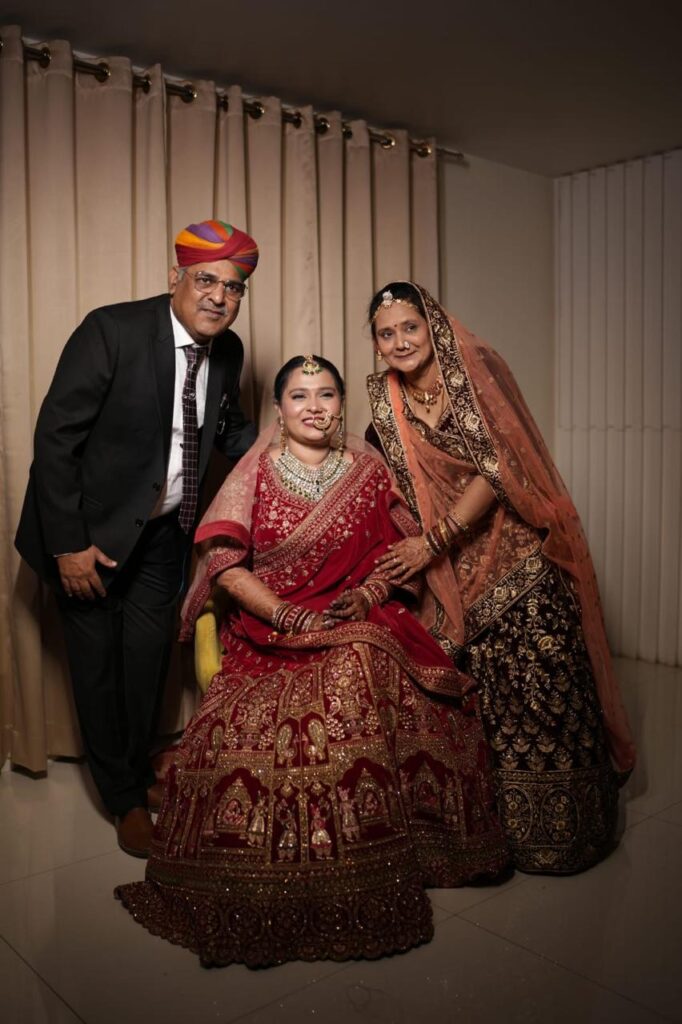
Nidhi with her father and mother
Boss Naari: So now, did you ever blame yourself or anyone else for this condition? Or did anyone else, like your friends or relatives, ever blame you?
Nidhi: No, no one blamed me. They were obviously always trying to help, but when you are frustrated, insecure, and done with everything, you start criticizing your own body. Because all over your body you see so many changes. You do not like to see yourself in the mirror, and you start loving yourself a little less. So yes, that happened. But I always made sure, even though it is not easy, never to blame myself.
Boss Naari: As you said, you got a lot of unsolicited advice. Were there any common pieces of advice you heard repeatedly?
Nidhi: Well, the obvious one was weight loss. Everyone kept saying weight loss is the best thing to do. And once you talk about weight loss, you are given lots and lots of advice, like have jeera water in the morning, have methi seeds water in the morning, do exercise, do yoga, do gym, do aerobics. These were the standard weight loss suggestions.
There were other things too. Because my cycle has always been a bit long, mothers and older women in the family always had some tips and home remedies. Eat papaya, eat ajwain (carom seeds), eat jaggery, stay warm so you will get your periods. Do not do this so they will not get extended. For cramps they had solutions too.
Obviously, some home remedies did help, but the thing is, they are never the complete solution. They are just quick fixes. And sometimes they are not even that.
Boss Naari: What challenges did you face with PCOS, as there might be weight gain issues or related problems, and how did you work on it?
Nidhi: I was always a chubby kid, so when the weight gain happened, it was not that noticeable. But when I got diagnosed at that time, I was almost 88, and that was a lot. I worked hard to reduce it, but it was difficult because I could never fall into a routine.
Back then, I was a C.A. student. We had exams in May and November, and in between, we got two months of break between results and exams. That was the time I would religiously exercise, follow a strict diet, attend follow-ups, and do everything properly. Then the results would come, some failures would happen, and I would go back to studying for 16 hours and sleeping for five hours a week. That messed up not just my weight but also my skin.
Because of work stress and every minor thing happening in my life, my existing symptoms would get amplified. I was already stressed with weight gain because I could not lose it, and this stress caused acne. I already had oily skin, and this amplified the acne. It was very frustrating, to be honest.
The worst was when COVID hit. By that time, I had actually cracked the weight loss process. It took me around five years to figure out what worked for me. It was basic, like walking and a proper diet. But when COVID happened, everyone had some lingering symptoms. For me, one of those was hair fall.
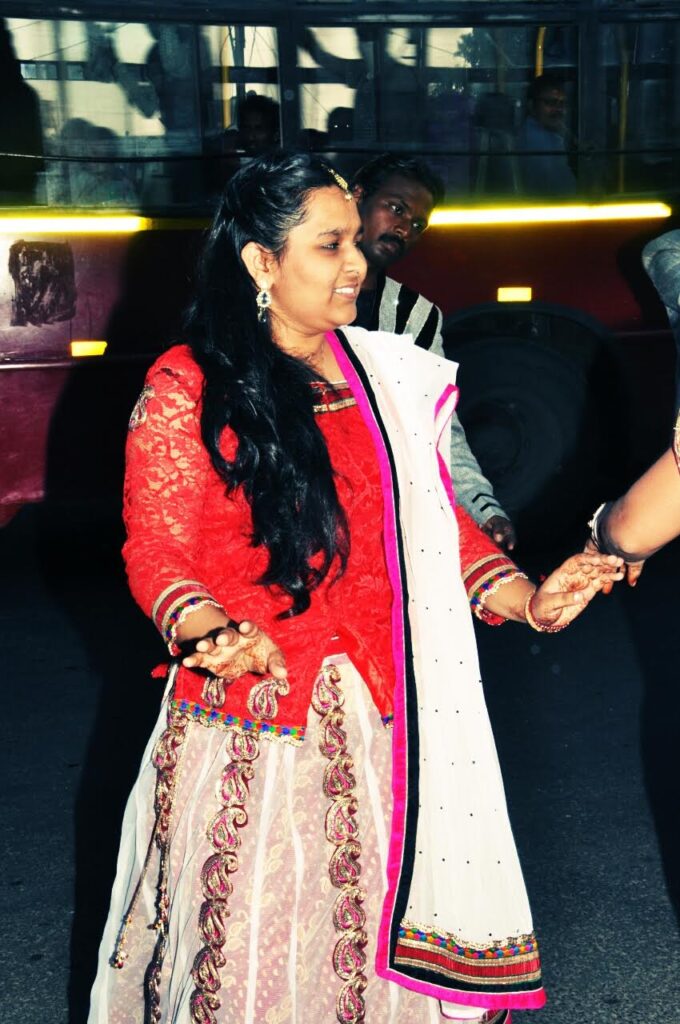
Losing weight was one of Nidhi’s goals, for which she followed all possible methods, including exercise, diet, and more
Boss Naari: Besides the weight gain, were there other changes in your body or health that you noticed?
Nidhi: After COVID, my hair started falling out and it was one of the symptoms of PCOS. I used to have such gorgeous hair. They were very thick, and now I could see my scalp because so much hair had fallen. It scared me so much. I tried lots of advice: different oils and serums, yet hair fall was the worst.
In case of weight, I could manage my weight to some extent. I lost weight from 88 to 68. I knew that even if I gained a little, I could get it back under control. I also realized that just weight loss and exercise were not the solution. By that time, I felt like I was finally understanding all my symptoms and my body other symptoms of PCOS were seen.
I was also taking sugar tablets, as I had insulin issues, and my sugar levels were rising. That was another shock. My doctor explained that I was not diabetic, this was because of my hormones.
Boss Naari: Out of the insulin, weight gain, and hair fall, which was the worst for you?
Nidhi: Hair fall was the worst part. I even did Platelet-Rich Plasma (PRP) treatment for hair fall, where my plasma was injected into my scalp for six months. I saw some baby hair growth after two months, which seemed positive. By the end of six months, I had less hair than before, and it completely backfired. I was taking too many medicines and decided to stop everything.
One day, my family doctor asked what I did for my hair. I told him about the Platelet-Rich Plasma treatment, and he was furious. He said that after seven or eight years dealing with PCOS, I should have researched better. PRP was not good for PCOS because it can also be a reason for hormonal imbalance. For six months, I was harming myself.
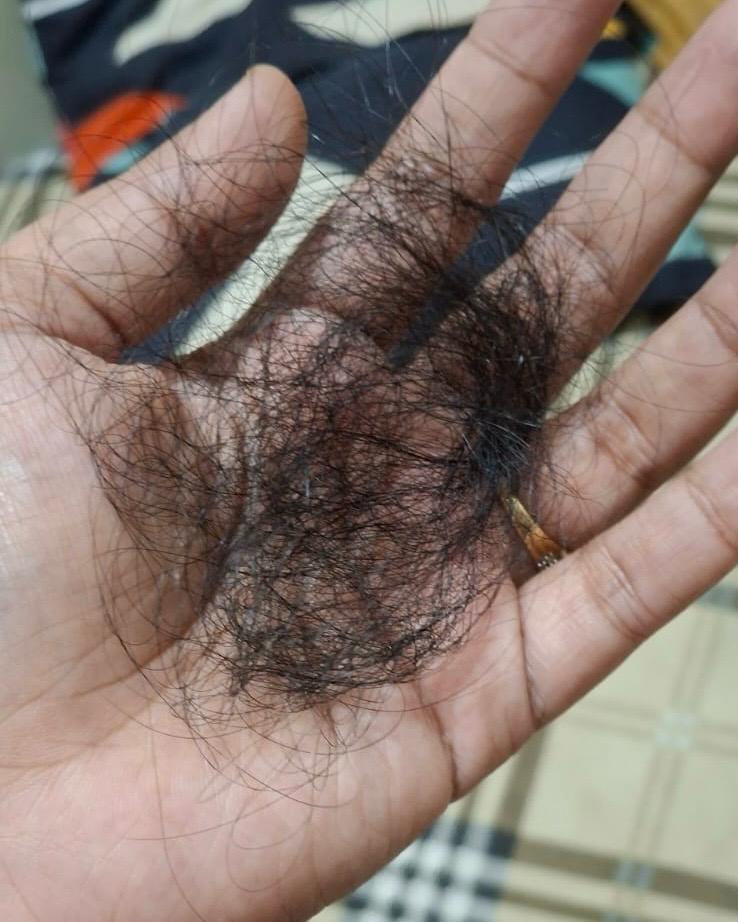
Number of hair strands Nidhi loses every day
Boss Naari: So how was it dealing with all these challenges and trying to make your body work properly?
Nidhi: I was exercising, trying to lose weight, eating healthy, and at the same time trying to get through the depression of repeated failures. Sometimes I would quit because it was too much. During COVID, everything felt depressing and negative. I was learning to manage things, but it was exhausting.
Even my family followed the same diet to make me feel normal, not sick. But restrictive diets, even if you are not sick, make you feel unwell because of all the medicines you take and the restrictions. I was taking medicines for acne, hair, sugar, and cramps.
I always had severe cramps every month. I would stay in bed with a hot water pouch and darkness. During such times, comfort food helped, and I gave in to it. All the effort of exercise and diet would break in those three days, and it would take weeks to get back into routine. It became an endless cycle of progress and setbacks.
From 2015 till COVID in 2020, I had been managing all of this. I went to different specialists. My gynecologist had been consistent for over ten years. Many treatments were quick fixes. Sometimes I would skip my cycle for 2-3 months, or I would bleed for 15-30 days. I had to take medicines to regulate my cycle. Sometimes I would let it cleanse naturally; sometimes I had to take medicines to stop prolonged bleeding.
Contraceptives were mostly prescribed to regulate my cycle, but one of the side effects was weight gain. I could see people around me getting results from exercise and diet, but not me. That made me want to give up at times.
After months of continuous efforts without results, I would give up, chill for a month, and then start over again. Forcefully, inducing periods was always more painful, with more cramps, heavier flow, and mood swings.
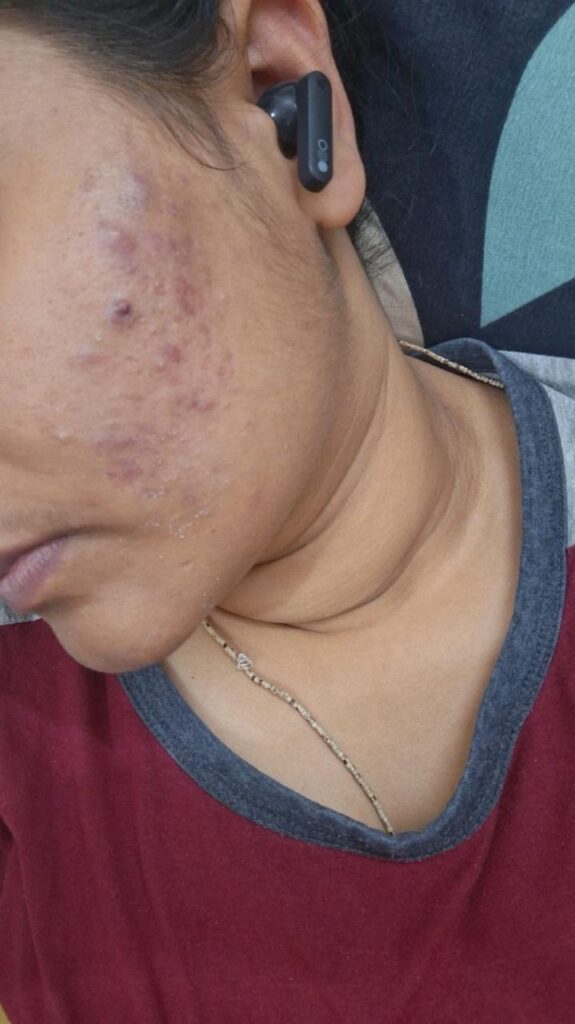
Acne is one of the issues Nidhi faces due to PCOS
Boss Naari: Now, Nidhi, since you have been living with PCOS for so many years, how has your understanding of it evolved over time?
Nidhi: For me, initially, I thought I had all the symptoms. But then I read more about PCOS and talked to people who were experiencing similar issues. As I mentioned earlier, from the day I was diagnosed and even before that, I had been noticing irregularities. After I was diagnosed with PCOS I had label to what I was experiencing.
Loosing weight has always been difficult, and many times i would feel like i wasn’t doing enough. I never had a sweet tooth so managing my sugar intake wasn’t a problem, but I junk food was my comfort and I had to put in lots of efforts to give my body not just what it was craving but also what it actually needed.
As I grew up I met many women who had PCOS and every one of them had different symptoms and different solutions, I also learned there is a thing called lean PCOS. This made me realise that weight loss is not a cure or PCOS. We all need to understand what our body needs and work on that instead of chasing one size finally remedies or treatments.
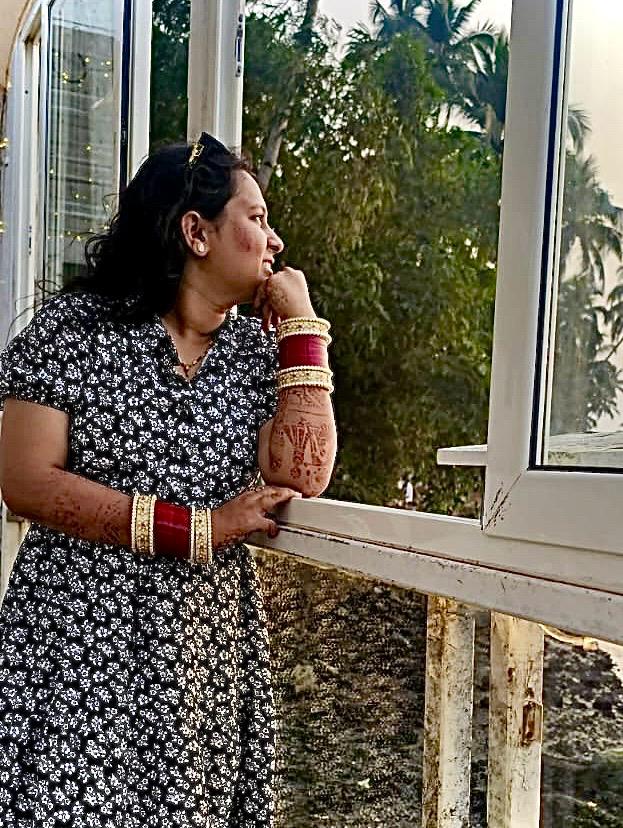
Nidhi is managing and living happily, accepting her body
Boss Naari: How mentally and emotionally challenging was this for you, and how did you overcome those challenges?
Nidhi: 90% percent of it depends on the people around you, but I think the most important person in your life is you. Accepting yourself, understanding your body, and loving it anyway is very important. It’s not easy to come to that conclusion, especially when every day you look in the mirror and do not find yourself beautiful. To truly love yourself, you also need to accept love from others. Having someone who loves you unconditionally, like your parents, friends, or anyone special in your life, helps a lot. As I said, I always loved myself; I consider myself my favorite person. Having that attitude helps, and being your favorite person and loving yourself truly makes a difference.
This doesn’t mean living recklessly or thinking you can do anything you want. You still need to respect your life, your exercise, diet, medicines, routines, and diagnosis. Loving yourself in a true sense means caring for your body. For example, if your sugar levels are high, you take measures such as cutting down sugar, walking regularly, and taking medicines as needed.
Just a healthy lifestyle is not always enough. There was a time when I quit all medicines and focused only on a healthy lifestyle. I did everything right for months, including limiting sugar and having planned cheat days. And yet during regular checkups, I noticed my sugar levels were still high. I was frustrated because I had lost weight, exercised regularly, and followed a healthy routine. Then I realized that my body could focus on only one thing at a time, either balancing hormones or controlling sugar. If my sugar levels were okay, I might skip my cycle, and if my cycle was normal, sugar levels could rise. My body naturally prioritized certain functions, and this is where medicines play an important role. Skipping medicines is not a solution; they are not a cure, but they are necessary. Many programs claim to cure PCOS, and I have tried a couple, but I realized that at the end of the day, only you and your gynecologist can help manage it effectively.
I started taking proper medicine for sugar while continuing with my cycles and routines. For almost two years, throughout 2022-23, I had a perfectly normal cycle and routine. The only issue remaining was hair fall. I gave up on trying or experimenting with treatments for it. I accepted my body along with my hair.
Boss Naari: Did you notice any changes in your body even after being consistent?
Nidhi: For almost 2 and 1/2 years, everything had been normal. My cycle was regular, and though I had cramps, I had learned to manage the pain without depending on medication. Hot water or an ice pack would help, and over time, I had adjusted to it.
In 2024, when I got engaged, I experienced a complete emotional roller-coaster. The thought of moving out, starting a new life, and leaving my parents was overwhelming. I cried often, not out of sadness but due to the intensity of emotions. These emotional changes affected my hormones, and my cycle became irregular again. After two and a half years of normalcy, my body needed to readjust.
Because of these hormonal and emotional fluctuations, I had to go back on medicine cycles for regulation. I was prescribed contraceptives, but since I wanted to lose weight before my wedding, I chose to let my cycles come naturally. However, when they did not, I took a short 5-day hormone course to induce them.
Throughout this period, the support and understanding of my family, especially my father and grandfather, were crucial. They ensured I ate properly, rested, and took care of myself, even when I was irritable or in discomfort. Their understanding made a big difference in managing both the emotional and physical challenges.
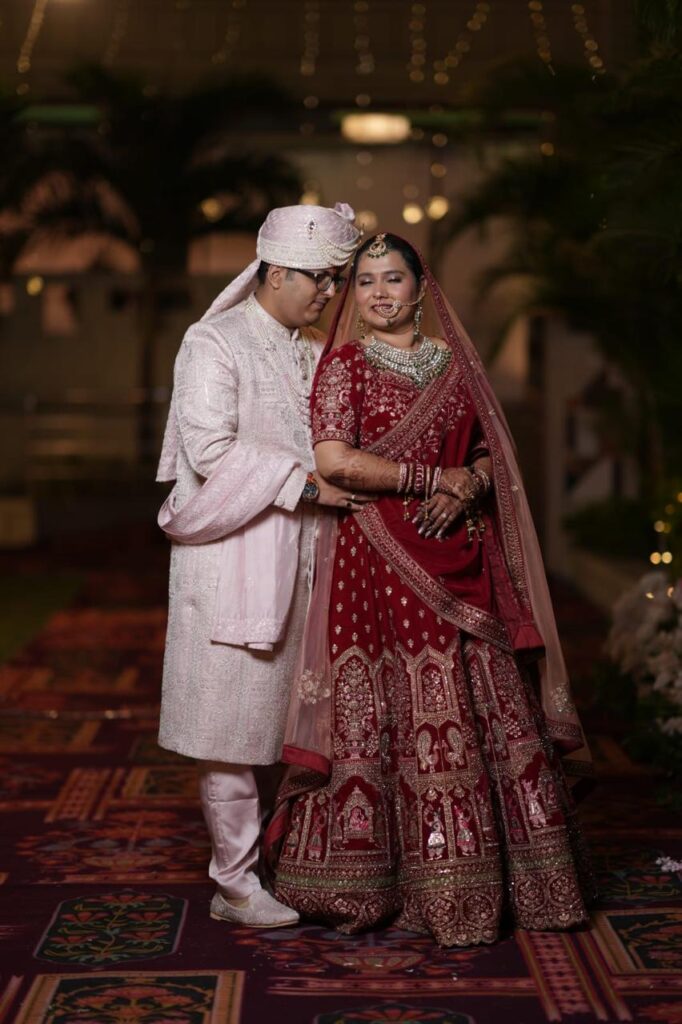
Nidhi with her life partner
Boss Naari: As you said, you got engaged and married. How was the support from your in-laws and your husband, and how did it matter to you? There is still a myth that women should not speak about PCOS, especially in the context of marriage. How did you handle that?
Nidhi: Honestly, the support was very similar to what I had at home. Even my partner was understanding, recognizing that I had specific needs and sometimes required extra care. Early on, I realized it wasn’t about holding onto frustrations or questioning why someone acted a certain way. It was about letting go and focusing on love and acceptance. Small gestures, like someone complimenting you when you feel self-conscious because of a bump or acne, can wash away a lot of pain. That kind of support matters, not just from family or friends, but from everyone around you. Once people understand what you’re going through, they can react, comfort, and support better. This awareness is important for men as well, not just women, so they can respond with understanding and empathy.
Many families believe that discussing PCOS could affect a girl’s marriage prospects, but for me, I never felt ashamed. I knew that if someone rejected me because of this condition, they were never the right person for me. I believe every girl having PCOS should not hide. If a partner cannot support you through these things, they simply aren’t the right fit. When I met my husband, I openly told him about my PCOS and the medication I take for sugar control. That was the only topic I felt necessary to discuss before marriage. It was comforting that he immediately took the time to research PCOS and understand the condition. That showed me he cared and was willing to support me.
This kind of openness is essential because it allows both partners to understand the realities of living with PCOS.
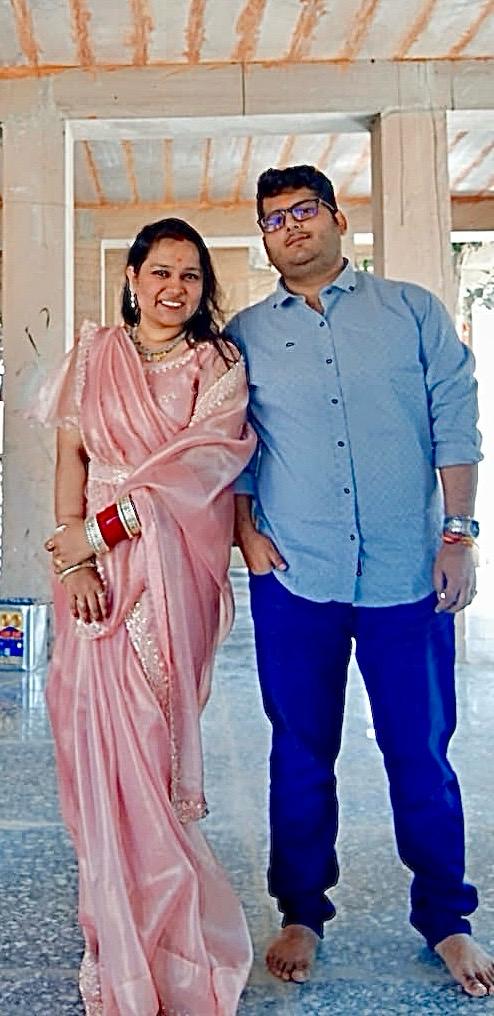
With her strongest pillar of support
Boss Naari: Many women don’t speak up or show up because of stigma. As someone who has lived with PCOS and also experienced support from family, partner, and others, what advice or message would you give to women who should speak up and take care of themselves?
Nidhi: My first advice is to speak up. Beyond that, it really helps to know that you’re not alone. Understanding that other women are going through similar experiences can be very comforting. That’s why I started a PCOS blog on LinkedIn, to create a space where women could connect, share, and reach out. And it did happen. I received messages from women who resonated with my posts.
Secondly, know your body and its symptoms. Don’t just follow what others do. PCOS affects everyone differently. Loving yourself means taking care of your body, meeting its needs, and doing what works best for you. Lapses, pauses, or even occasional indulgences are part of life.
Third, understand that taking care of your health is not just physical but emotional too. Your family, friends, and partner can help immensely. Having someone who believes in you and supports your decisions makes the journey easier.
Finally, don’t be afraid to take medications if needed. They are not a crutch or weakness; they are tools to help your body function properly while you work on a lifestyle that suits you.
The ultimate message is: accept yourself, love yourself, speak up when necessary, and focus on consistent small efforts rather than expecting overnight fixes. PCOS is a lifelong journey, but it can be managed successfully with knowledge, patience, and support.
Want to be featured on NaariSpeaks?
Do you have a story that could inspire another woman or help someone going through a similar journey? We’d love to hear from you and share your voice with our community.
Liked what you read?
Sign up and get the latest blog posts delivered straight to your inbox.
We respect your privacy
Related Arcticles

Down syndrome didn’t define her; dance did
Down syndrome didn’t define her; dance did Dance became the language of Sayalee Agavane, a Down Syndrome professional dance artist who has transformed every stage

Raising a child with Down Syndrome
Raising a child with Down Syndrome Parenting a child with Down syndrome is a journey filled with unique experiences, and the early days of acceptance

Living with extra chromosomes
Living with an extra chromosome Down syndrome cannot stop anyone from achieving their dreams, and Madhumati Indalkar is a beautiful example of that. Madhumati has

Reading this is like walking through a sunlit glade, noticing light, shadow, and texture. Each sentence invites attentive reflection and subtle awareness.